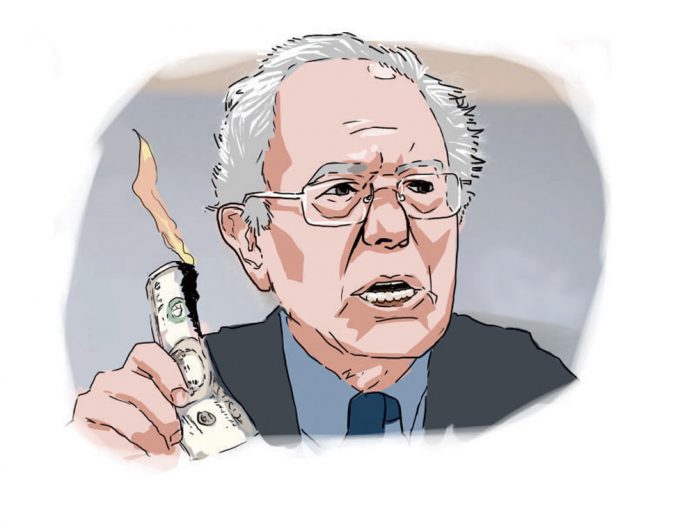Dhiraj Nallapaneni
Staff Writer
Recently, a report by the Tax Policy Center estimated the Bernie Sanders’s economic plans would add about $18 trillion to the national debt over the next decade. Though the number is astounding, it is important to make an effort to take a closer look at what this spending
First, as Paul Waldman stated in an article for the Washington Post [[[link this? What’s the point of this statement? It’s common sense that Americans are spending money on this]]], Americans already are spending money on things like healthcare and college tuition. Sanders’ economic plans simply make these services a societal responsibility just like roads and the military. Although the private sector is in most cases able to provide maximum efficiency, there are some sectors where the public may be able to perform the task more effectively, such as in healthcare.
In an article for CNBC, David Himmelstein and Steffie Woolhandler dispute the Tax Policy Center’s estimates, pointing out that a universal health care program like Sanders’ would lead to decreased administrative cost and decreased drug costs due to the increased bargaining power present in the single-payer system. In fact, the United States spends a far higher percentage of its GDP on healthcare than most other developed countries, including countries with a universal healthcare system such as the United Kingdom and Germany.
While Sanders’ potential spending is derided [[[how is it derided? Who is deriding?]]], programs like the Obama administration’s $1 trillion plan to upgrade the nuclear arsenal seem to receive almost zero attention from the mainstream media. Bernie Sanders is the only candidate that has taken a firm stance against this nuclear weapons modernization program asking, “How does it happen that we have a trillion dollars available to expand our nuclear arsenal, but we don’t have the money to take care of the children in this country?” It seems as if programs meant to benefit working people are met with histrionics about potential cost while increased military spending that primarily benefits the defense industry is accepted as a fact of life.
It seems that Sanders’s increased social spending is receiving increased scrutiny compared to increases in military spending. While these increases in social spending, such as infrastructural and educational spending are meant to increase future economic productivity and create positive externalities while also decreasing growing trends of economic inequality.
In short, this kind of activity is geared toward creating a more positive society rather than the usual pouring money into often unsuccessful regime change, such as in Libya during Hillary Clinton’s tenure as secretary of state. President Eisenhower once illustrated the human cost of reckless military spending, saying, “Every gun that is made, every warship launched, every rocket fired signifies, in the final sense, a theft from those who hunger and are not fed, those who are cold and are not clothed.” As Eisenhower made clear, the hawkish stances of the other candidates serve as an impediment to the general welfare of the people.
It is also important to note that the economic plan of Donald Trump, the probable nominee of the supposedly fiscally conservative party, does not bring America any closer to a balanced budget than Sanders’s does. The Tax Policy Center analyzed Trump’s plans and found that his tax cuts for the wealthiest Americans would cost about $9.5 trillion over the next decade.
Of course, the Tax Policy didn’t take into account the cost of Trump’s proposed programs as they did for Sanders. Trump has promised to deport all illegal immigrants and build a border wall while refusing to say where spending cuts would occur. Republicans using the $18 trillion figure to mock the fiscal profligacy of the left should probably take a critical look at their own side.
It’s important to understand this $18 trillion figure rather than to just look at the headlines and proclaim that certain programs that are meant to create a better society are impossible. We must understand why countries like Germany and the United Kingdom are able to perform the same services more efficiently and why pouring money into nuclear weapons that will never be used is somehow more acceptable.











